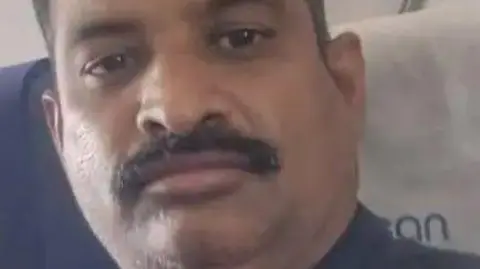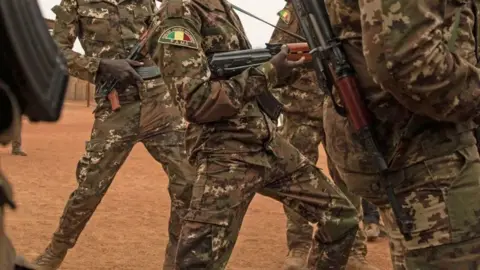BBC Telego
 Koteswara Rao
Koteswara RaoA week after the kidnapping of three Indians in Mali, their families say they still have no information about their whereabouts and are concerned about their safety.
The Indian Ministry of Foreign Affairs said that the men, who worked in a cement factory in Mali, “were forcibly taken” by a group of “armed attackers” last Tuesday.
The Mali government has not yet attached, but the kidnappings in one day of a group related to al -Qaeda – Nasr al -Islam Mosque and Wall Misselman (JNIM) – Several attacks In the African country.
According to government data, about 400 Indians have lived in Mali, a country that India has made trade relations since the 1990s.
The incident last week comes after Five Indian citizens were kidnapped In Niger, in April, during an attack by armed men also killed dozens of soldiers, Reuters reported. There is no update to where they are.
Niger, Mali and Burkina Faso are fighting a rebellion linked to al -Qaeda and the Islamic State (IS) that started in northern Mali in 2012 and since then it has spread to neighboring countries.
Mali is the eighth largest country in the African continent and the fall in the Sahel region in Africa, which was described by the Global Terrorism Index (GTI) as the “global terrorism center” earlier this year. The region represents “more than half of all deaths related to terrorism,” according to GTI.
In a statement one day after the kidnapping, the Indian Ministry of Foreign Affairs urged citizens who live in Mali to “exercise the utmost caution, stay in a state of vigilance and stay in close contact with the Indian embassy in [Mali’s capital] Bamako. “
Men were transferred from the diamond cement factory, run by the Prasaditya group, the Indian Business Group, in Kayez. The company and the factory have not released any data yet. BBC has contacted them to respond.
On the same day as men were kidnapped, jihadist fighters launched a series of coincidences on military positions across many cities in Mali.
A Kais resident told the BBC that the BBC manufacturer could hear gunshots “everywhere” during the attack.
The kidnappings raised a wave of panic among Indian relatives of those living in Africa.
The Indian government said it was in contact with the authorities in Mali, the factory in which the men worked, and the kidnapped men – but the BBC Telgo spoke to members of the family of two men who said they had little information about his relatives.
 AFP via Getty Images
AFP via Getty ImagesThe mother of Panad Vincaramana, one of the kidnapped men who worked as an engineer at the factory, said that she last spoke to her son on June 30.
“He will work and call later,” said Narsma, who passes only with one name.
“After three days, we received a call from the company, but we were unable to understand what the caller says. At a later time, we saw on television that my son had been kidnapped,” she added.
Fenkatramana from the eastern state of Odisha and his family filed a complaint with the local police, seeking to help them find it.
They found support from the former Prime Minister of Odisha Patnaik, which was published on X, and urged Foreign Minister S Jaishankar to “intervene personally in this matter” and ensure “early and safe release” for Venkatramana.
In the southern states of Telangana and Andhra Pradesh, members of another kidnapped family are waiting for Amaralingaeswara Rao who worked as an assistant general manager of the factory – anxious him to return home.
His father Koorakula Venkateswarlu BBC told the Telgo that his son went to Mali eight years ago to support his family.
“The salary [in India] It was low. “He has three children to raise.”
His son was planning to visit India in October and book airline tickets. But now, he says, they have no idea about when they will be.
Follow BBC News India Instagramand YouTubeand twitter and Facebook.
https://ichef.bbci.co.uk/news/1024/branded_news/023f/live/8c0830b0-5bc4-11f0-9b31-0de8e3acd144.jpg
2025-07-09 05:15:00














